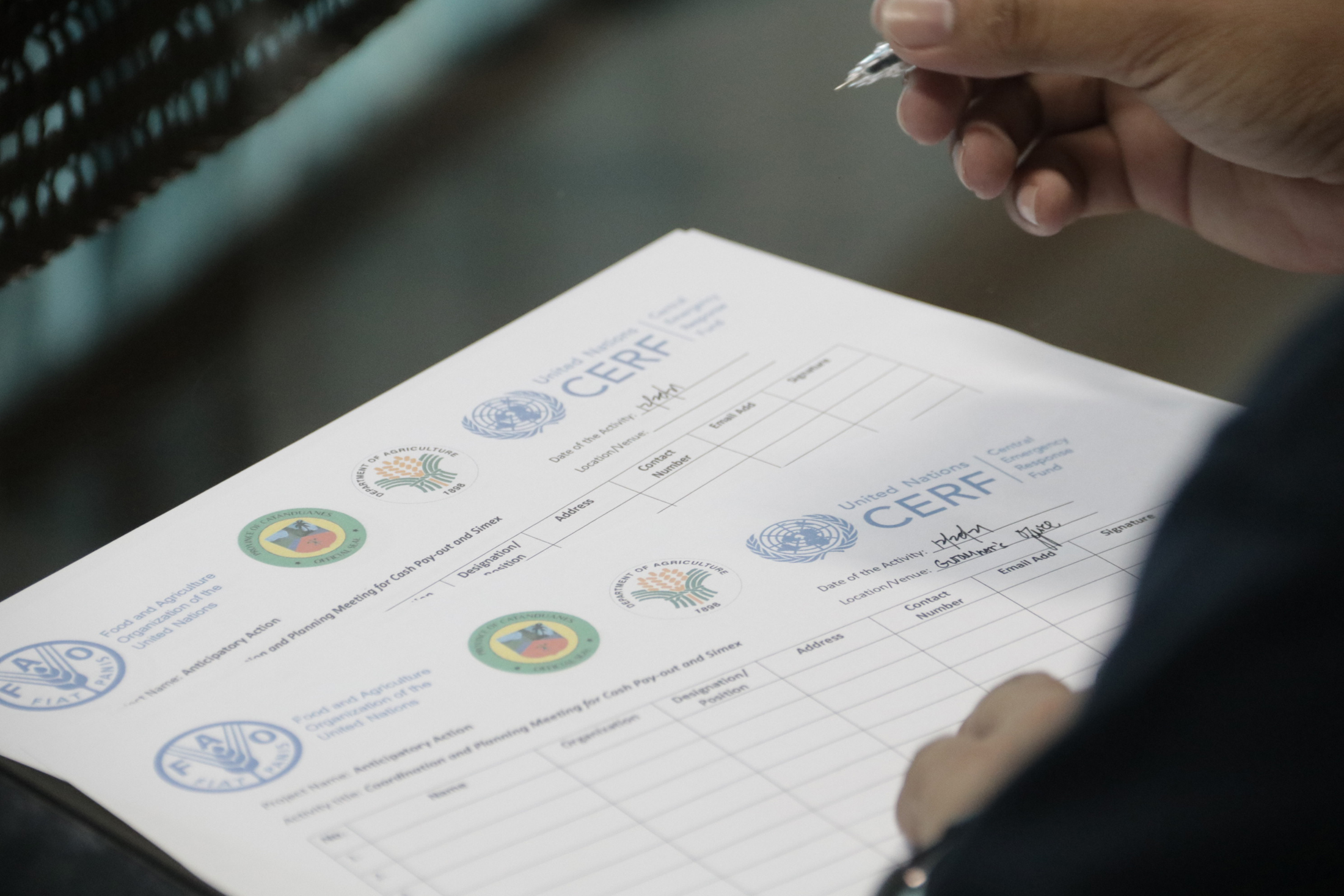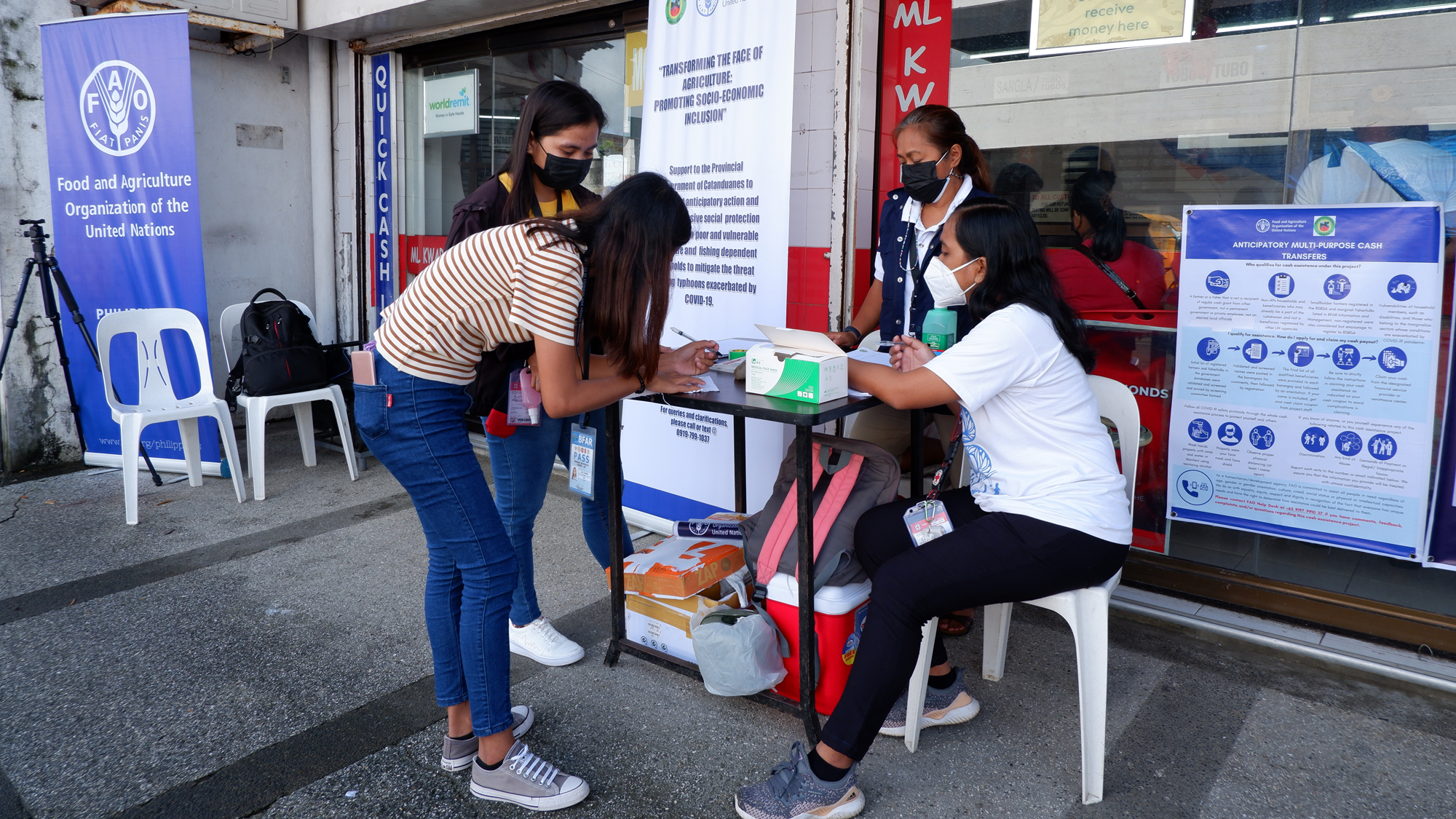Investing in the foundations of social protection systems for ensuring shock responsiveness in the Philippines

This self-assessment, prepared by FAO regional offices and priority area leads implementing projects as part of the COVID-19 Programme, forms part of the evaluation of the COVID-19 Response and Recovery Programme. The evaluation seeks to answer questions about timeliness, relevance, collaboration, normative values, business continuity and contributions of the COVID-19 Programme.
Facilitating the economic inclusion of men, women, youth and the elderly in rural areas is critical to ending hunger and achieving sustainable and long-term rural poverty reduction. This became an even more urgent imperative given the outbreak of the COVID-19 pandemic and its negative impacts on incomes, food security and nutrition, especially among poor households. Accordingly, FAO supported the national social protection system of the Government of the Philippines in responding to COVID-19.
COVID-19 has taken a heavy toll on agricultural livelihoods, particularly in poor communities of farmers and fisherfolks. Disaster-prone communities have been even more exposed to its negative socio-economic impacts. The most pressing issues during COVID-19 were lack of income opportunities and reduction of pay, and continued insufficient food supply, health and nutrition issues. Disruptions to jobs and livelihoods caused by lockdown measures were exacerbated by recurring natural shocks, such as typhoon Odette.
Such circumstances were particularly challenging for the newly established Bangsamoro Autonomous Region in Muslim Mindanao (BARMM), which has the highest incidence of poverty in the country. The economic impact was severe due to the vast informal sector present in the Region, the unusually high rate of employment in agriculture and the high share of wage labourers. This meant that highly restrictive measures on movement of people and goods negatively impacted on incomes for a great part of the population in the region, with dire repercussions on access to food and health services.
The Philippines’ flagship social
protection programme, the Pantawid Pamilyang Pilipino Program (4Ps), and
the COVID-19 emergency cash assistance programme, Social Amelioration
Programme (SAP), were the two main social assistance instruments used by
the government to support households in managing the COVID-19 shock.
Notwithstanding their large coverage, the ability of these programmes to
mitigate the negative impacts of COVID-19 was limited, partly due to
difficulties in extending coverage to new beneficiaries. In fact, the
targeting accuracy of the programmes varied greatly.
This experience is highlighting the need for investing in developing
the capacities of national social protection systems so that they are
able to provide adequate support to households, including in response to
shocks.
In the Philippines, FAO’s COVID-19 Recovery and Response Programme: Economic Inclusion and Social Protection to Reduce Poverty (RPP) was geared towards enhancing the national social protection system’s response to COVID-19 and strengthen its capacities to better address future shocks.

Enabling the national social protection system
The
ability of the Philippines’ national social protection system to reduce
poverty and food insecurity, and enhance the economic inclusion of
households in rural areas is paramount to strengthen the resilience of
its beneficiaries. In a context of increasing and compounding shocks, so
too is its capacity to scale up to provide additional support to
families when such shocks occur.
- FAO organized and held the Adaptive and Shock Responsive Social Protection (ASRSP) Training course for the Philippines
which enabled participants from different government agencies to
understand the relevance of social protection in addressing shocks and
equip them with tools to strengthen the domestic system. This on-line
training course ran for eight weeks and was delivered in partnership
with the Economic and Policy Research.
- The Government of
the Philippines developed its Roadmap for establishing an adaptive and
shock responsive social protection system, with technical support
provided by FAO and adopted in 2021. This five-year roadmap is a crucial
milestone for reducing the vulnerabilities of vulnerable households in
the country, increasing their risk management capacity, and enhancing
their economic inclusion and resilience.
- FAO supported
the operationalization of the roadmap. In the Bangsamoro Autonomous
Region of Muslim Mindanao, the Philippines’ flagship social protection
scheme, the Pantawid Pamilyang Pilipino Programme (4Ps) was expanded
horizontally to include 181,000 new beneficiaries, who received a PHP
5,000 cash grant per household. Additionally, the programme expanded
vertically for 326,000 existing beneficiaries, who received a
proportional top-up of their standard PHP 3,650 cash grant.
- Towards the end of December 2021, as part of a simulation exercise to test the delivery of anticipatory action ahead of typhoons, multi-purpose cash grants were distributed to newly identified 1,072 smallholder farmers and fisherfolks in the province of Catanduanes, specifically in the two typhoon-prone municipalities of Gigoto and Baras. Those who did not have a bank account and pay-out card were equipped with one. As a result, PHP 3,220 was provided to identified beneficiary households previously excluded from social protection programmes to cover expenses for transportation, basic needs, and livelihood support.

Good Practices and Lessons Learned
With
specific reference to the COVID-19 RRP an important good practice was
the contracting of GCash and Metrobank to deliver the cash assistance.
These partnerships with financial service providers on the
digitalization of cash assistance constitute a crucial step to improving
the delivery of financial support to underserved areas, as well as to
enhance the economic inclusion of end-beneficiaries. Additionally, they
hold great potential in opening up new, timely and more effective
transfer modalities for emergency scale-ups, such as cash transfers in
anticipation or in response to a shock.
Important lessons
learned with respect to FAO’s social protection support to Members are
that investments in the foundations of social protection systems over
time are critical to enabling them to rapidly respond to shocks.
Foundational investments that FAO contributed to in the Philippines and
that enabled swift response are:
Policy:
In recent years FAO played a key role in nurturing an enabling policy
environment to strengthen the social protection system and make it
adaptive and shock-responsive. This included FAO’s direct contributions
in drafting and facilitating the process that led to the adoption of the
Philippine Social Protection Plan 2020–2022 and the Roadmap for
establishing an adaptive and shock responsive social protection system.
This provided the basis for FAO’s involvement in supporting the national
and BARMM government through the scale-ups at the height of the
pandemic as well as in piloting anticipatory protocols for typhoons.
Institutional coordination:
Extensive consultations conducted with stakeholders in developing the
Roadmap made it possible to forge a common understanding of how to
respond in the face of shock. This contributed to a swift expansion of
the 4Ps, something that would not have been possible if different
stakeholders had not shared a common vision.
FAO operations:
The main lesson is the need for FAO to have a standard cash transfer
process, which would help increase timeliness of interventions. Since
FAO currently does not have one, the Organization had to spend a lot of
time looking for a possible financial service provider that would
facilitate the delivery of cash transfers to recipients. A one-FAO
approach on cash transfers would contribute to the efficiency and
effectivity of the programmes being implemented by the Organization,
making it more responsive to the needs of the beneficiaries.
